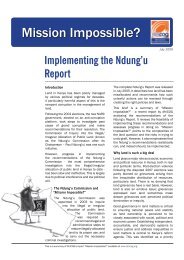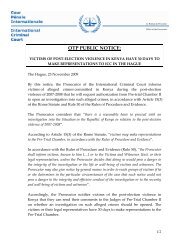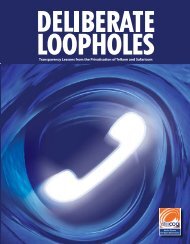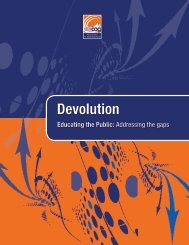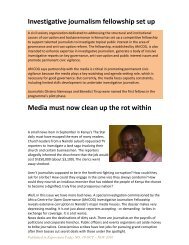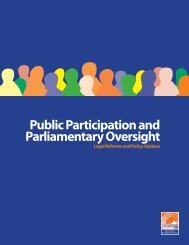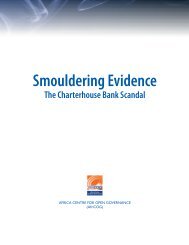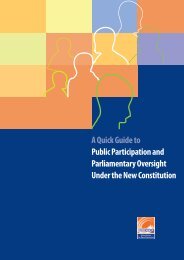Untitled - Africa Centre for Open Governance
Untitled - Africa Centre for Open Governance
Untitled - Africa Centre for Open Governance
You also want an ePaper? Increase the reach of your titles
YUMPU automatically turns print PDFs into web optimized ePapers that Google loves.
4.1.3. Kazi Kwa Vijana<br />
The Kazi Kwa Vijana initiative was designed under Agenda 4 of the National Accord and<br />
Reconciliation Act (NARA) of 2008 to address youth unemployment in Kenya. According to<br />
various media reports, more than KES 308 million of public money meant <strong>for</strong> the Kazi Kwa Vijana<br />
project was lost by the Office of the Prime Minister and related implementing ministries between<br />
2008 and 2010. The amounts were stated to have been lost through irregular, unauthorized and<br />
otherwise dodgy payments made in breach of the Government’s and the World Bank’s procedures<br />
and regulations.<br />
An interim report by the World Bank indicated that the money was disbursed to senior civil<br />
servants and other ineligible third parties, that millions were paid to unrelated project activities<br />
and that expenditures were incurred in excess of the approved limits. There were numerous<br />
payments made without proper supporting documents as well as payments made <strong>for</strong> contracts<br />
that contravened the World Bank and government procurement procedures. 66<br />
Specific examples cited included KES 1.2 million meal allowances paid to employees while they<br />
were at their work stations, KES 173, 668 commuter allowance irregularly paid to employees at<br />
the PM’s office and the unauthorized hiring of 26 interns. More than KES 1.5 million was allegedly<br />
paid out to unknown and unauthorized persons and retroactive payments made on apparently<br />
fraudulent invoices. A Mrs. Gesame, Director of Policy- was said to have misrepresented her status<br />
as local consultant so as to be hired as the project director while in fact she was still on GOK salary.<br />
She was allegedly paid KES 407, 000 per month as “top-up”.<br />
4.1.4. Arid Lands Resource Management Project<br />
In July 2011, the World Bank released a Forensic Audit of the USD 1.9 billion Bank-funded Arid<br />
Lands Resource Management Project (ALRMP II) reporting fraudulent and questionable use of the<br />
Project’s funds <strong>for</strong> the fiscal years 2007 and 2008, totalling KES 515 million. The audit covered only<br />
seven of the 28 districts where the project operated, plus project headquarters. In October 2011<br />
Kenyan officials met with those of the World Bank to agree on a process of determining the actual<br />
project amount lost. The Government was liable to repay the World Bank <strong>for</strong> all funds classified as<br />
ineligible, including those deemed fraudulent and those lacking supporting documentation. In<br />
October 2011, the Government refunded KES 40 million to the World Bank.<br />
Underwriting Corruption<br />
A disturbing practice emerged whereby the Government refunded money to donors after it was<br />
found to have disbursed “ineligible expenditure”. Joint audits between Government and donors<br />
appear to have revealed that officers in line ministries misappropriated donor funds following<br />
which the donors threatened to stop the funding and demanded their money back. Treasury<br />
admitted to misappropriation and used tax payers’ money to effect the refunds, citing the<br />
provisions in financing agreements and the importance of continued funding.<br />
66 World Bank, “Kenya Youth Empowerment Project (KYEP): In-depth Review,” August 2011<br />
29




